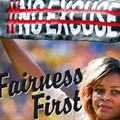#NewCampaign: Giant Films' Ian Gabriel on the new Carling Black Label ad
I interviewed director Ian Gabriel to find out why the Carling brand decided to engage in this conversation and why he believes its important for the brand and society with ’belief-driven buying’ on the upsurge…
 Masculinity is a topic that came up at Cannes this year. There has been much emphasis on women or feminism of late, yet alongside this there has also been much confusion regarding manhood and what it means to be a man in the 21st century. The ad points out that most men have learned what this means the wrong way, from their fathers or father-figures and peers, and seeks to redefine the true meaning of what it means to be ‘bold’, ‘brave’ and ‘strong’. What is the brand’s opinion on the matter? Why is this important to the brand?
Masculinity is a topic that came up at Cannes this year. There has been much emphasis on women or feminism of late, yet alongside this there has also been much confusion regarding manhood and what it means to be a man in the 21st century. The ad points out that most men have learned what this means the wrong way, from their fathers or father-figures and peers, and seeks to redefine the true meaning of what it means to be ‘bold’, ‘brave’ and ‘strong’. What is the brand’s opinion on the matter? Why is this important to the brand?
I can’t speak for the brand but I can speak for myself. As I understand it, the Carling brand is seeing the necessity to engage in this conversation, which is very much top of mind around the world at present. As consumers we all have the power to support brands that support good values and to boycott those whose values we oppose. We effectively fund what the brands we support say.
According to research, ’belief-driven buying’ is on the upsurge worldwide, especially among Gen Z and millennials. I think this is a positive democratising effect that we should celebrate as a small way to improve our thinking and attitudes in the world.
 What impact do you hope to have on society?
What impact do you hope to have on society?
Any time you challenge prejudices in a society you take a risk, but not challenging these prejudices poses a bigger risk for society in the long run.
When we discussed how we wanted to approach this film, we made it clear that our objective would be to deliver what is in fact a moral message in a non-moralistic nuanced way. You need to be sensitive and respectful of diverse views, but you can do that and still advance radical improved ways of being. We have to do this so that generations to come can reap the benefits of our thoughts and actions. Given how much negative effect has been passed on by previous generations and our own (global warming, shocking wealth disparity, etc.), where we can leave positive results we should do so. We probably can’t change the world, but we can try make it a bit better when given the opportunity.
 Tell us more about the risk involved; why you believe the brand was well positioned to challenge this issue, and at such a time as this.
Tell us more about the risk involved; why you believe the brand was well positioned to challenge this issue, and at such a time as this.
There is greater risk in avoiding pressing subjects that we all care about. The objective was to be non-judgmental and inclusive, and non-exploitative of issues that everyone can see staring them in the face – plenty of people have made and continue to make mistakes and judge others around matters of identity, sexuality, race, background, etc.
The message of being who you are and believing in yourself is broader than the focused message that we applied in this commercial. We wanted people to feel like the thinking process in the commercial was unfolding with them. That was what really informed my direction of Pallance in the commercial. He needed to think his way with us observing what we saw and staying only slightly ahead of our thinking, rather than delivering a ‘know it all, seen it all’ message which is often where walk-and-talk deliveries can land.
 What has the response been?
What has the response been?
Word of mouth and social media responses have all been very positive. Some people have questioned whether delivering a positive message should be the role of an alcohol brand. To that I can only point to how strong their message has been, and to point to US public relations agency Edelman’s Global Trust Barometer 2017 report, which had these findings to share: consumers globally expressed a lack of trust in the social and political institutions that are meant to represent them.
There’s a growing belief that ‘brands can do more to solve social ills than government can’. The more we can do to promote positive values in whatever work we do, the better for the world, the better for the brands. Why ever would we then not do that?
 How is this campaign different to previous Carling Black Label ads?
How is this campaign different to previous Carling Black Label ads?
I have worked on many Carling campaigns over the last 20 years – they have always dealt with the idea of ‘what it means to be a real man’. So, in a way this campaign answers a question that is no different from those earlier campaigns. It’s just the answer to the question that has shifted, thankfully, over the passage of time, and being cognisant of important new responses to old events and ideas.
The emergence of the #metoo movement, the current supreme court debate in the USA, the continuing battle for gender rights, the growth of intersectionality around the gender and race debate, etc. – all of these factors have helped to move the conversation in a better direction.
 What can we expect in the coming months?
What can we expect in the coming months?
I suspect Carling and its agency will continue along the path they’ve already mapped out for themselves. I think that’s where consumers will encourage them to go. I can’t imagine that they would now deviate much from this path until the message is well and truly delivered and understood.
 Anything you’d like to add?
Anything you’d like to add?
In order for brands to succeed, I think they need to not only speak out with conviction, but to act on the convictions they express.We live in a very self-curated society. We try to present the most positive image of ourselves on social media, and brands have realised they must do the same. We’ve lost a certain amount of privacy in the process, but we can control the positive effects and ensure that the trade-off works as a two-way exchange. Brands that promote better social values will earn the loyalty of consumers who will advocate for that brand because we’d all like to be living in a better world.
To find out more about Gabriel, this campaign and others he's directed, go to GiantFilms.tv.



































